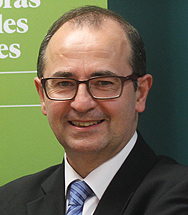A researcher at the University has been appointed member of the Pontifical Academy for Life
Carlos Centeno Cortes directs the Palliative Medicine Unit at the Clínica Universidad de Navarra and is the principal investigator of the ATLANTES Program within the Institute for Culture and Society

Carlos Centeno Cortes, Director of the Palliative Medicine Unit at the Clínica Universidad de Navarra and Principal Investigator of ATLANTES: Human Dignity, Advanced Illness, and Palliative Care within the Institute for Culture and Society, has been appointed a corresponding member of the Pontifical Academy for Life.
Centeno, a medical doctor and surgeon, studied at the University of Valladolid; he obtained a university certificate in bioethics and has a master’s degree in palliative medicine. He specialized in radiation therapy for oncology at the University Hospital of Valladolid, where he participated in the launching of the first hospice team in Castila and Leon. He was also a clinical researcher at the University of Alberta, Canada (1998).
He is the author of over 110 papers published in national and international journals on topics related to palliative care. He has also published a Handbook of Palliative Medicine for students and an Atlas of Palliative Care in Europe and another in Latin America. As Professor of Palliative Medicine, he teaches within the School of Medicine and other centers at the University of Navarra, in addition to several institutions in Spain, Italy and Portugal.
Pope John Paul II created the Pontifical Academy for Life in February 1994, defining it within the Apostolic Letter Mysterium Vitae. The goal of the Academy is the promotion and defense of human life within the framework of bioethics guided by Christian morality.
Three other experts from the University of Navarra belong to the Academy, including Nunziata Comoretto, a visiting researcher with the ATLANTES program, Jokin de Irala, Professor of Preventive Medicine and Public Health and principal investigator of ICS’ Education of Human Affectivity and Sexuality project, and Gonzalo Herranz, Professor of Biomedical Humanities within the School of Medicine.
